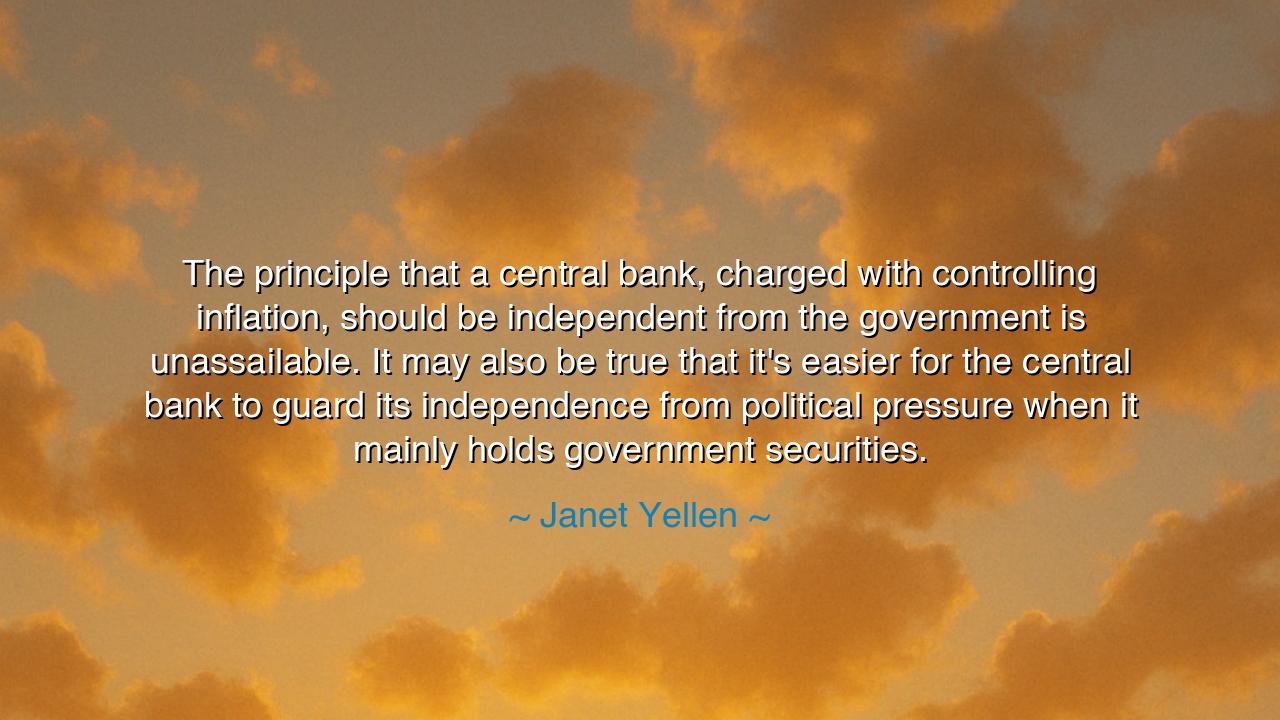
The principle that a central bank, charged with controlling
The principle that a central bank, charged with controlling inflation, should be independent from the government is unassailable. It may also be true that it's easier for the central bank to guard its independence from political pressure when it mainly holds government securities.






The Guardians of Balance
Hear, O seekers of wisdom, the voice of Janet Yellen, who stood among the keepers of the world’s treasure and spoke these words of quiet power:
“The principle that a central bank, charged with controlling inflation, should be independent from the government is unassailable. It may also be true that it's easier for the central bank to guard its independence from political pressure when it mainly holds government securities.”
At first, these words may seem born of numbers, charts, and silent chambers of finance. Yet within them lies a truth as old as kingship itself—a truth about power, balance, and the fragile harmony between authority and freedom. For though this saying speaks of banks and currencies, its wisdom reaches far beyond the vaults of gold: it speaks of the eternal struggle between the hand that rules and the mind that must remain free.
The Eternal Tension of Power
From the dawn of civilization, rulers have sought to command not only armies and laws but also the flow of wealth—the lifeblood of their dominions. Yet those who control the coin also control the people’s hope, their bread, and their toil. Independence, therefore, becomes not a luxury, but a sacred duty, a shield that guards the realm from the storms of passion and politics.
Yellen’s words echo the ancient principle that the guardian must never become the servant of the throne. For when those who measure and temper the value of labor yield to the will of power, inflation—that silent thief—devours nations from within. Gold loses meaning, bread doubles in price, and trust, the foundation of all exchange, turns to dust. Thus, she calls for the independence of the central bank, not as a mere technical matter, but as a moral necessity—a fortress against the corruption of desire and the tyranny of short-term gain.
The Lessons of Empires
Consider the fall of Rome, that vast and mighty empire whose roads and legions stretched from sea to sea. In its twilight, when emperors sought to buy loyalty with gold rather than earn it with virtue, they commanded the mints to produce more coins, each worth less than the one before. The silver of the denarius thinned, the markets trembled, and faith in the currency perished. Rome did not collapse in a single battle—it rotted from within, betrayed by its own excess and the rulers who could not restrain their greed.
Had there been an independent steward of value—one untouched by political hunger—the decline might have been delayed, even averted. But there was none. Thus, the empire that had conquered the world could not conquer its own inflation.
The Hidden Wisdom of Restraint
Yellen’s teaching, though spoken in the language of economists, is the teaching of sages: he who controls must learn restraint. For the power to create money, like the power to forge swords, is a divine responsibility—it can build peace or bring ruin. A central bank, standing apart from the passions of rulers, must serve as the steady heart of a nation’s economy, keeping rhythm while others rush and rage.
She warns that when it holds the instruments of the state—government securities, those symbols of trust—it is better able to guard its freedom. For dependence on private whim or external greed weakens the guardian’s arm. To be free, it must hold what is public; to remain pure, it must never bow to the private hunger of power.
The Mirror of the Individual
Yet this truth does not belong to nations alone—it belongs to every soul that seeks wisdom. For each of us holds our own form of central bank, our inner balance between passion and prudence, between desire and discipline. If we surrender that balance to the storms of emotion or the demands of others, our personal economy—our peace, our focus, our purpose—falls into chaos.
Thus, as the bank must guard its independence, so must we guard our judgment. We must learn to hold our own values, our own “securities,” that we may not be swayed by the fleeting pressures of the world.
The Law of Temperance
The ancients spoke of temperance, the golden mean between excess and deficiency. Yellen’s words are but a modern echo of this eternal law. The state, like the soul, must learn moderation; it must allow its guardians the space to deliberate, to act with reason rather than passion. When governments seize too much control, they lose the trust of their people. When individuals let others dictate their choices, they lose the rhythm of their hearts. Independence is not arrogance—it is balance.
The Lesson for Future Generations
Therefore, children of tomorrow, remember this: freedom without discipline is ruin, and discipline without freedom is tyranny. Whether you govern a household, a company, or a nation, let your decision-makers be free from the storms of ego and haste. Build institutions—and inner selves—that can stand firm when temptation whispers, “Spend now, pay later.”
Let your actions be like the central bank, measured and watchful. Guard your independence, not out of pride, but out of wisdom. And when you hold the treasures of others—be they trust, love, or wealth—hold them with the same solemn care that preserves the value of a nation. For as gold is tested by fire, so is integrity tested by power.






AAdministratorAdministrator
Welcome, honored guests. Please leave a comment, we will respond soon